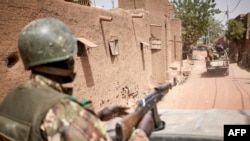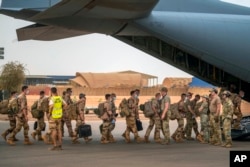The security of civilians in Mali has improved in recent years, but the country must remain vigilant, according to human rights experts.
Alioune Tine, who was appointed in 2018 by the United Nations Human Rights Council to assist the Malian government in protecting its citizens, visited the country February 8-17.
During a video press conference on Tuesday, Tine noted an improvement in security in central and northern parts of the country. However, he also voiced concern about the withdrawal of international partners from Mali after France announced February 17 that its troops would leave because of tensions with the military government.
Tine ended his remarks by calling for "more integrated security strategies focused on the protection of civilian populations and their fundamental human rights."
The improved security situation coincides with a military offensive in the past few months by the Malian army. Some activists say that the offensive involved arbitrary arrests and disappearances among the Fulanis, an ethnic group that resides mostly in north and central Mali. Fulanis say they are often unfairly accused of being jihadists.
Ibrahim Diallo is a member of two Fulani cultural organizations, Tabital Pulaaku and Pinal. He said that during a recent offensive in Niono, in Mali's Segou region, some Fulani youth fled when they saw the army, fearing they could be unfairly targeted. As they fled, Diallo said, they were fired upon.
Diallo said he knows two people who were shot and has heard that they died, but has not seen the bodies.
Aly Barry is a doctor from the Mopti region in central Mali and a member of a Fulani association. He said from Bamako via a messaging app that the Malian army's successful advances are "undeniable," but that actions have negatively impacted the human rights of civilians.
Barry said a few dozen people were arrested February 20 in Niono, but he doesn't know if they are in prison or dead.
Aguibou Bouaré is president of the National Commission on Human Rights, a governmental organization that independently investigates human rights abuse accusations in Mali. Bouaré confirmed that the security situation in the center and north of the country has improved, but said the commission has concerns about human rights abuses during the past few months of "ramping up" by the Malian army.
He said his group is recording allegations of human rights violations that are attributed to the armed security forces during this period, and that the investigations are continuing.
VOA reached a Malian army spokesman by phone, but he refused to comment on the incidents in Niono or elsewhere in the country.





